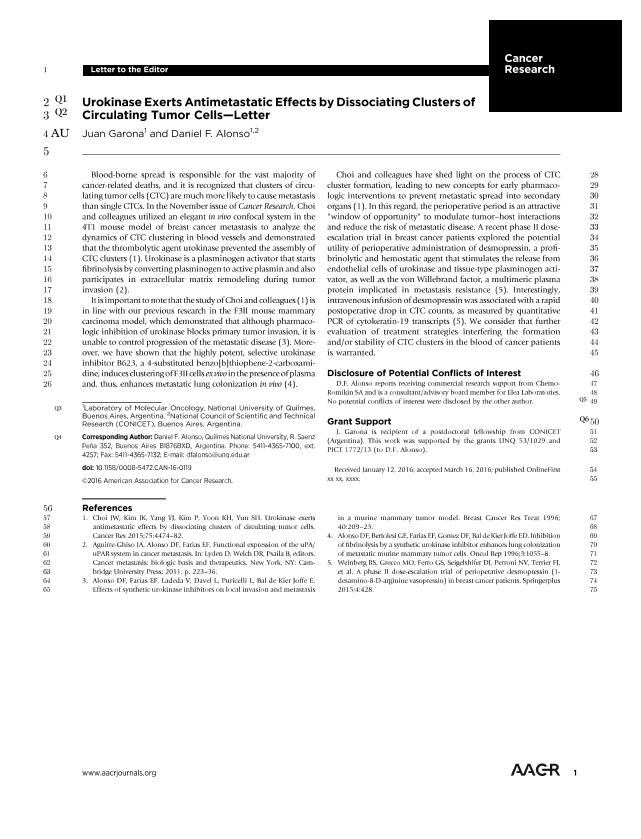Artículo
Urokinase Exerts Antimetastatic Effects by Dissociating Clusters of Circulating Tumor Cells–Letter
Fecha de publicación:
08/2016
Editorial:
American Association for Cancer Research
Revista:
Cancer Research
ISSN:
0008-5472
e-ISSN:
1538-7445
Idioma:
Inglés
Tipo de recurso:
Artículo publicado
Clasificación temática:
Resumen
Blood-borne spread is responsible for the vast majority of cancer-related deaths, and it is recognized that clusters of circulating tumor cells (CTC) are much more likely to cause metastasis than single CTCs. In the November issue of Cancer Research, Choi and colleagues utilized an elegant in vivo confocal system in the 4T1 mouse model of breast cancer metastasis to analyze the dynamics of CTC clustering in blood vessels and demonstrated that the thrombolytic agent urokinase prevented the assembly of CTC clusters (1). Urokinase is a plasminogen activator that starts fibrinolysis by converting plasminogen to active plasmin and also participates in extracellular matrix remodeling during tumor invasion (2). It is important to note that the study of Choi and colleagues (1) is in line with our previous research in the F3II mouse mammary carcinoma model, which demonstrated that although pharmacologic inhibition of urokinase blocks primary tumor invasion, it is unable to control progression of the metastatic disease (3). Moreover, we have shown that the highly potent, selective urokinase inhibitor B623, a 4-substituted benzo[b]thiophene-2-carboxamidine, induces clustering of F3II cells ex vivo in the presence of plasma and, thus, enhances metastatic lung colonization in vivo (4). Choi and colleagues have shed light on the process of CTC cluster formation, leading to new concepts for early pharmacologic interventions to prevent metastatic spread into secondary organs (1). In this regard, the perioperative period is an attractive “window of opportunity” to modulate tumor–host interactions and to reduce the risk of metastatic disease. A recent phase II dose-escalation trial in breast cancer patients explored the potential utility of perioperative administration of desmopressin, a profibrinolytic and hemostatic agent that stimulates the release from endothelial cells of urokinase and tissue-type plasminogen activator, as well as the von Willebrand factor, a multimeric plasma protein implicated in metastasis resistance (5). Interestingly, intravenous infusion of desmopressin was associated with a rapid postoperative drop in CTC counts, as measured by quantitative PCR of cytokeratin-19 transcripts (5). We consider that further evaluation of treatment strategies interfering with the formation and/or stability of CTC clusters in the blood of cancer patients is warranted.
Palabras clave:
Urokinase
,
Antimetastatic
,
Desmopressin
,
Cancer Treatment
Archivos asociados
Licencia
Identificadores
Colecciones
Articulos(SEDE CENTRAL)
Articulos de SEDE CENTRAL
Articulos de SEDE CENTRAL
Citación
Garona, Juan; Alonso, Daniel Fernando; Urokinase Exerts Antimetastatic Effects by Dissociating Clusters of Circulating Tumor Cells–Letter; American Association for Cancer Research; Cancer Research; 76; 16; 8-2016; 4908-4908
Compartir
Altmétricas




